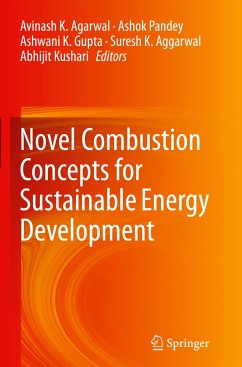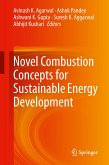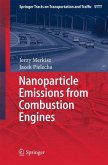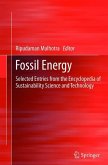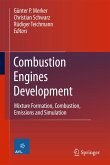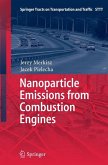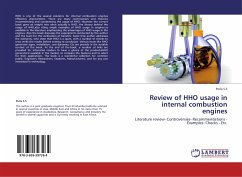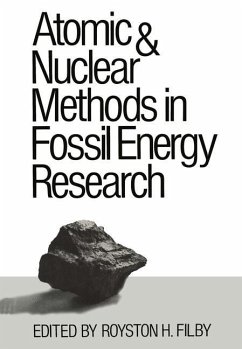Novel Combustion Concepts for Sustainable Energy Development
Herausgegeben:Agarwal, Avinash K.; Pandey, Ashok; Gupta, Ashwani K.; Aggarwal, Suresh K.; Kushari, Abhijit
Novel Combustion Concepts for Sustainable Energy Development
Herausgegeben:Agarwal, Avinash K.; Pandey, Ashok; Gupta, Ashwani K.; Aggarwal, Suresh K.; Kushari, Abhijit
- Broschiertes Buch
- Merkliste
- Auf die Merkliste
- Bewerten Bewerten
- Teilen
- Produkt teilen
- Produkterinnerung
- Produkterinnerung
This book comprises research studies of novel work on combustion for sustainable energy development. It offers an insight into a few viable novel technologies for improved, efficient and sustainable utilization of combustion-based energy production using both fossil and bio fuels. Special emphasis is placed on micro-scale combustion systems that offer new challenges and opportunities. The book is divided into five sections, with chapters from 3-4 leading experts forming the core of each section. The book should prove useful to a variety of readers, including students, researchers, and professionals. …mehr
Andere Kunden interessierten sich auch für
![Novel Combustion Concepts for Sustainable Energy Development Novel Combustion Concepts for Sustainable Energy Development]() Novel Combustion Concepts for Sustainable Energy Development155,99 €
Novel Combustion Concepts for Sustainable Energy Development155,99 €![Nanoparticle Emissions From Combustion Engines Nanoparticle Emissions From Combustion Engines]() Jerzy MerkiszNanoparticle Emissions From Combustion Engines77,99 €
Jerzy MerkiszNanoparticle Emissions From Combustion Engines77,99 €![Fossil Energy Fossil Energy]() Fossil Energy130,99 €
Fossil Energy130,99 €![Combustion Engines Development Combustion Engines Development]() Combustion Engines Development86,99 €
Combustion Engines Development86,99 €![Nanoparticle Emissions From Combustion Engines Nanoparticle Emissions From Combustion Engines]() Jerzy MerkiszNanoparticle Emissions From Combustion Engines77,99 €
Jerzy MerkiszNanoparticle Emissions From Combustion Engines77,99 €![Review of HHO usage in internal combustion engines Review of HHO usage in internal combustion engines]() Perla S.S.Review of HHO usage in internal combustion engines27,99 €
Perla S.S.Review of HHO usage in internal combustion engines27,99 €![Atomic and Nuclear Methods in Fossil Energy Research Atomic and Nuclear Methods in Fossil Energy Research]() FilbyAtomic and Nuclear Methods in Fossil Energy Research41,99 €
FilbyAtomic and Nuclear Methods in Fossil Energy Research41,99 €-
-
-
This book comprises research studies of novel work on combustion for sustainable energy development. It offers an insight into a few viable novel technologies for improved, efficient and sustainable utilization of combustion-based energy production using both fossil and bio fuels. Special emphasis is placed on micro-scale combustion systems that offer new challenges and opportunities. The book is divided into five sections, with chapters from 3-4 leading experts forming the core of each section. The book should prove useful to a variety of readers, including students, researchers, and professionals.
Produktdetails
- Produktdetails
- Verlag: Springer / Springer India / Springer, Berlin
- Artikelnr. des Verlages: 978-81-322-3569-9
- Softcover reprint of the original 1st ed. 2014
- Seitenzahl: 576
- Erscheinungstermin: 27. September 2016
- Englisch
- Abmessung: 235mm x 155mm x 29mm
- Gewicht: 966g
- ISBN-13: 9788132235699
- ISBN-10: 813223569X
- Artikelnr.: 46000927
- Herstellerkennzeichnung Die Herstellerinformationen sind derzeit nicht verfügbar.
- Verlag: Springer / Springer India / Springer, Berlin
- Artikelnr. des Verlages: 978-81-322-3569-9
- Softcover reprint of the original 1st ed. 2014
- Seitenzahl: 576
- Erscheinungstermin: 27. September 2016
- Englisch
- Abmessung: 235mm x 155mm x 29mm
- Gewicht: 966g
- ISBN-13: 9788132235699
- ISBN-10: 813223569X
- Artikelnr.: 46000927
- Herstellerkennzeichnung Die Herstellerinformationen sind derzeit nicht verfügbar.
Prof. Avinash Kumar Agarwal is currently Poonam and Prabhu Goyal Endowed Chair Professor of Mechanical Engineering at Indian Institute of Technology Kanpur, India. Prof. Agarwal was at ERC, University of Wisconsin, Madison, as a Post-Doctoral Fellow (1999 ¿ 2001). His areas of interest are engine combustion, alternative fuels, biofuels, natural gas, hydrogen, conventional fuels, optical diagnostics, laser ignition, HCCI, emission and particulate control, and large bore engines. Prof. Agarwal has published more than 120 peer reviewed international journal papers and 70 peer reviewed international conference papers. Prof. Agarwal is an associate editor of ASME Journal of Energy Resources Technology, and International Journal of Vehicle Systems Modelling and Testing. He is editorial board member of `IMechE Journal of Automobile Engineering, and `International Journal of Oil, Gas, and Coal technologies¿ and has edited ¿Handbook of Combustion¿ . Prof. Agarwal is a Fellow of ASME in class of 2013, and Fellow of SAE International, USA in class of 2012. He is recipient of several prestigious awards such as NASI-Reliance Industries Platinum Jubilee Award-2012, INAE Silver Jubilee Young Engineer Award-2012; Ralph R. Teetor Educational Award -2008; INSA Young Scientist Award-2007; UICT Young Scientist Award-2007; INAE Young Engineer Award-2005. A.K. Gupta is Distinguished University Professor at the University of Maryland. He received his PhD from Sheffield University, UK and higher doctorate DSc from the University of Sheffield and also from the University of Southampton, UK. He was awarded honorary doctorate from the University of Wisconsin Milwaukee USA and also from King Mungkut University of Technology North Bangkok, Thailand that was bestowed by HRH the Queen of Thailand. He served as international consultant to the Japanese government METI for NEDO project on novel high-temperature air-combustion technology (called HiTAC). He served as Director of Propulsion and Energy at AIAA. He is a Fellow of AIAA, ASME and SAE. He is co-editor of an environmental energy book series and associate editor of 4 journals. He has published over 650 papers, 3 books, 12 book chapters and edited 11 books. He received the University of Maryland President Kirwan research award, College of Engineering research award and several awards from ASME and AIAA for his research in combustion, propulsion and air pollution. His research interests include: high intensity distributed combustion, sulfur chemistry and recovery from acid gases, gasification, fuel reforming, biofuels, multi micro sensors and combustion control, supersonic mixing and combustion, membranes for gas separation, and laser diagnostics. Professor Ashok Pandey is Deputy Director at CSIR¿s National Institute for Interdisciplinary Science and Technology at Trivandrum and heading the Centre for Biofuels and Biotechnology Division there. His research interests are on bio-based economy development (biomass-based biorefinery) for the production of fuels and chemicals. He has over 1000 publications/communications (which include 14 patents & design copyrights, 37 books, 100 book chapters, 390 original and review papers), with an h index of 64 and more than 17,700 citation (Goggle Scholar). Professor Pandey is the recipient of many national/international awards and fellowships, which include Fellow of International Society for Energy, Environment and Sustainability; National Academy of Science (India); Biotech Research Society, India; International Organization of Biotechnology and Bioengineering and Association of Microbiologists of India; Honorary Doctorate degree from Univesite Blaise Pascal, France; Thomson Scientific India Citation Laureate Award, USA; Visiting Professor in the University Blaise Pascal, France, Federal University of Parana, Brazil and EPFL, Switzerland, etc.. He is Founder President of BRSI, General Secretary, IFIBiop and Vice-President of ISEES & AIBA. Prof Pandey is Editor-in-chief of Bioresource Technology, Honorary Executive Advisor of Journal of Water Sustainability and Journal of Energy and Environmental Sustainability. Dr. Abhijit Kushari is a Professor in the Department of Aerospace Engineering at the Indian Institute of Technology Kanpur, India. Dr. Kushari earned his B. Tech (Honours) in Aerospace Engineering from Indian Institute of Technology Kharagpur in 1994 followed by an MS in Aerospace Engineering in 1996 and a PhD in Mechanical Engineering in 2000 from Georgia Institute of Technology, Atlanta, Georgia. He joined IIT Kanpur as a visiting faculty in July 2001 and then as an Assistant Professor in the Department of Aerospace Engineering at IIT Kanpur in September 2001. Since then he has been a faculty at IIT Kanpur and was promoted to Professor in June 2014. Dr. Kushari¿s research interests lie primarily in the area of Aerospace Propulsion. He is currently involved in various research projects in Turbo-machinery, Combustion, Liquid Atomization, Intake and Nozzle flows with an emphasis on the application of various flow control techniques in these processes and systems. He has authored 2 book chapters, 52 papers in archived journals and has presented 54 papers in various national and international conferences on these topics. He is a member of various national and international societies in Combustion, Atomization, Aerospace Engineering etc. and is in the editorial board of 2 international journals.Dr. Suresh K. Aggarwal received his Ph.D. in Aerospace Engineering from Georgia Institute of Technology in 1979. Since then, he has been at Princeton University as a member of the Professional Research Staff, and at Carnegie-Mellon University as a Senior Research Engineer, and since 1984 with The University of Illinois at Chicago, where he joined as Assistant Professor, and was promoted to the rank of Professor of Mechanical Engineering in 1995. His other appointments include being the Director of Graduate Studies, Visiting Scientist at Argonne National Laboratory, USA, Visiting Professor at Ecole Centrale-Paris, France, and Guest Professor at Jiangsu University, China. Dr. Aggarwal's research and teaching interests include Combustion, Multiphase Reacting Flows, Renewable Fuels, Emissions, Clean Energy, Fire Suppression, and Microgravity Phenomena. He has authored over 300 journal and conference publications. His research has been funded by a number of federal agencies and companies, and has resulted in the graduation of 14 Ph. D. and 40 M.S. students. He is an ASME Fellow, AAAS Fellow, and AIAA Associate Fellow. He has served or currently serving as an Associate Editor of the AIAA Journal, the Founding Editor of the Int. J. of Reacting Systems (now J of Combustion), and on the Editorial Boards of Journal of Green Energy, and Book Series on Sustainable Energy Developments.
Part I: General.- Introduction.- Technical challenges and scientific approach for a sustainable energy efficient future.- Part II: Biofuels: Production, properties and applications.- Biofuels from biomass.- Biomass fuel quality enhancement and the respiratory quotient (RQ) for ranking fossil and biomass fuels based on CO2 emissions.- Effect of biodiesel utilization on tribological properties of lubricating oil in a compression ignition engine.- Hydrogen enriched syngas from biomass steam gasification for use in land based gas turbine engines.- Part III: Combustion of fuels and engine performance.- Future trends in commercial aviation engines' combustion.- Spectroscopic methods and visualization applied to combustion diagnoses.- Lean blow-out detection techniques for partially premixed flames in a dump combustor.- Fluidized bed combustion of coal, renewable fuels and waste: Current Status and Developments.- Using petroleum and biomass derived fuels in duel-fuel diesel engines.- Mixture preparation effects on distributed combustion for gas turbine application.- Flame characteristics of vaporized renewable fuels and their blends with petroleum fuels.- Process and reactor level simulations of coal-direct chemical looping combustion.- Acoustic reynolds stress: the source of coherent structures during combustion instability.- Developing surrogates for liquid transportation fuels: the role of spherically symmetric droplet combustion.- Part IV: Emissions.- Urban traffic emissions and associated environmental impacts in India.- Comparison of primary and secondary emissions from an internal combustion engine.- Emissions and soot in partially premixed combustion.-Low-emission, fuel-flexible combustion of liquid fuels.- PART V: Sustainable energy systems and efficiency improvements.- In-depth performance evaluation of RDF from landfill reclamation for green electricity generation in a downdraftgasifier.- ceramics for sustainable energy technologies with a focus on polymer derived ceramics.- Solid fuel rocket motor efficiency improvement scheme.
Part I: General.- Introduction.- Technical challenges and scientific approach for a sustainable energy efficient future.- Part II: Biofuels: Production, properties and applications.- Biofuels from biomass.- Biomass fuel quality enhancement and the respiratory quotient (RQ) for ranking fossil and biomass fuels based on CO2 emissions.- Effect of biodiesel utilization on tribological properties of lubricating oil in a compression ignition engine.- Hydrogen enriched syngas from biomass steam gasification for use in land based gas turbine engines.- Part III: Combustion of fuels and engine performance.- Future trends in commercial aviation engines' combustion.- Spectroscopic methods and visualization applied to combustion diagnoses.- Lean blow-out detection techniques for partially premixed flames in a dump combustor.- Fluidized bed combustion of coal, renewable fuels and waste: Current Status and Developments.- Using petroleum and biomass derived fuels in duel-fuel diesel engines.- Mixture preparation effects on distributed combustion for gas turbine application.- Flame characteristics of vaporized renewable fuels and their blends with petroleum fuels.- Process and reactor level simulations of coal-direct chemical looping combustion.- Acoustic reynolds stress: the source of coherent structures during combustion instability.- Developing surrogates for liquid transportation fuels: the role of spherically symmetric droplet combustion.- Part IV: Emissions.- Urban traffic emissions and associated environmental impacts in India.- Comparison of primary and secondary emissions from an internal combustion engine.- Emissions and soot in partially premixed combustion.-Low-emission, fuel-flexible combustion of liquid fuels.- PART V: Sustainable energy systems and efficiency improvements.- In-depth performance evaluation of RDF from landfill reclamation for green electricity generation in a downdraftgasifier.- ceramics for sustainable energy technologies with a focus on polymer derived ceramics.- Solid fuel rocket motor efficiency improvement scheme.

